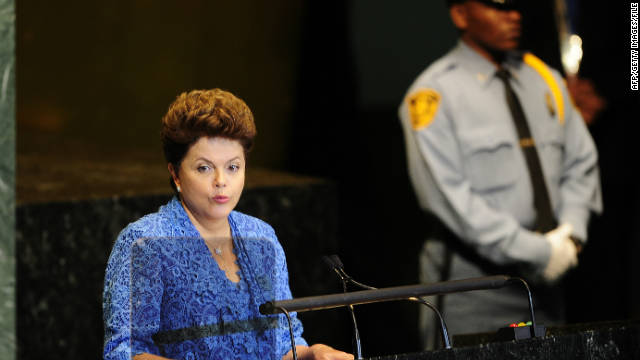Brazilian President Dilma Rousseff at the United Nations headquarters in New York, September 21, 2011.
(Financial Times) -- Brazil has declared a fresh "currency war" on the US and Europe, extending a tax on foreign borrowings and threatening further capital controls in an effort to protect the country's struggling manufacturers.
Guido Mantega, the finance minister who was the first to use the controversial term in 2010, said the government would not "sit by passively" as developed nations continue to pursue expansionary monetary policies at the expense of Brazil.
"When the real appreciates, it reduces our competitiveness. Exports are more expensive, imports are cheaper and it creates unfair competition for businesses in Brazil," he said on Thursday after announcing changes to the so-called IOF tax.
In a presidential decree, the government extended the existing 6 per cent financial transactions tax on overseas loans maturing in up to three years. Previously, the levy was applied only to loans with maturities of under two years.
President Dilma Rousseff later weighed in on the debate, vowing to defend Brazilian industry and stop developed countries' policies from causing the "cannibalisation" of emerging markets.
The move comes as Brazil's central bank also steps up direct intervention in the market, selling dollars and offering derivatives called reverse currency swaps to curb the real's near 9 per cent surge against the US dollar this year.
Brazil was one of the first emerging markets to speak out against the loose monetary policy of richer nations in the wake of the financial crisis, which it blamed for directing a flood of hot money to the country and overvaluing the real.
Although the crisis in the eurozone eased pressure on Brazil's currency late last year, a flurry of debt issuance this year has made the real one of the biggest gainers of 2012.
Countries from Colombia to Thailand have also followed suit with their own currency measures, and even the International Monetary Fund was seen to tacitly endorse the use of capital controls last April, giving Brazil's government further ammunition.
"These (currency intervention) practices were always just in reserve but today they are even recommended by the IMF," Mr Mantega said on Thursday. "The IMF didn't think this way and then they started to think this way mainly after Brazil introduced intervention measures which have been successful."
However, analysts doubt that such short-term measures will be enough to significantly change the direction of Brazil's currency.
"There is nothing they can do to really prevent the real from appreciating; they can just delay it from appreciating," said Italo Lombardi, Latin America economist at Standard Chartered.
He added that Thursday's measure would also have little effect because the average maturity of Brazilian bond placements abroad is much longer than three years.
After the announcement on Thursday, the real actually strengthened in midday trade to around 1.71 per dollar.

No comments:
Post a Comment